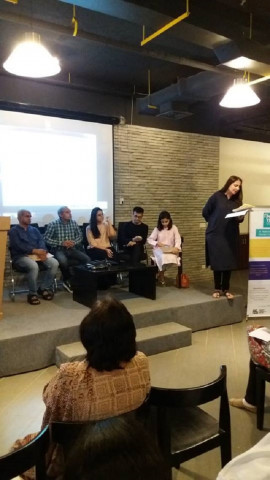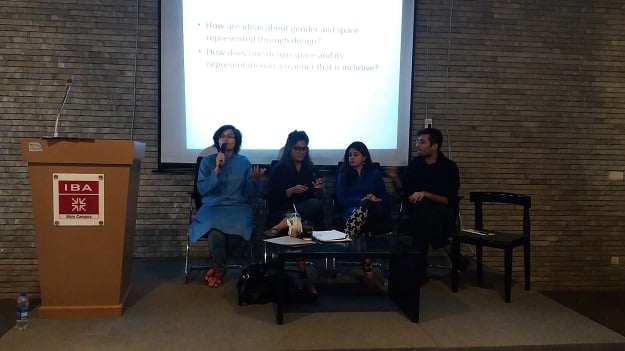Pictures speak louder than words
‘Postervism’ competition aims to encourage thought, experiments that express social issues

Poster competition aims to encourage thought experiments that express social issues
PHOTO COURTESY: FACEBOOK/IBA SOCIAL SCIENCES CLUB
The competition is geared towards promoting ‘design activism’, which refers to the act of creating posters entailing social or political commentary depicted through thought provoking visuals.
A series of panel discussions were held at the Institute of Business Administration (IBA) to discuss key community dynamics such as gender impartiality, identity and extremism. Academicians, graphic designers, architects and other professionals came together to discuss the objectives of this competition and to share their ideas regarding the vitality of activism.
In the first round, five panelists spoke about the coming together of activism and design. They shared details about an international competition called ‘Posters for Tomorrow’ from which this national poster competition is inspired. The phrase ‘pictures speak louder than words’ was the central idea behind the contest.
Graphic designer, photographer and visual artist, Sohail Zuberi talked about the power posters have had in promoting political content throughout history. He shared various pictures of posters plastered on Karachi’s street walls. These posters had been created by several religio-political groups and involved content regarding larger political ambitions and designs.
NAB initiates inquiry into Karachi Safe City project
“These posters imbibe alternative activism that takes place in the streets. The medium has been used during the Bolshevik Revolution in the Soviet Union and also during the Second World War by belligerents and defendants alike,” he said.
“The same form of activism is being remodeled by groups such as the Jamaat-e-Islami, Jamaatud Dawa and welfare groups like the alKhidmat Foundation - this is the democratic beauty of Karachi,” he marveled.
The second discussion was about gender, space and power relations. Writer and professor of anthropology at the Lahore University of Management Sciences (LUMS), Dr Nida Kirmani, gave a detailed information session regarding her work on space and gender relations. She talked about the role gender plays in the accessibility that people have to public and private spaces.
“Every space is gendered and people who do not fit in those gender categories are excluded, for example public washrooms are separate for males and females, but not for transgender people,” she said.
Political parties of Karachi oppose govt surveys of federal colonies
She added that this segregation is enforced sometimes by sexual harassment, other times by customs, laws or practices. There is limited inclusion for all gender groups in the process of knowledge creation.
Kirmani spoke about the acts of defiance and resistance girls in Lyari staged by organising an all-girls cycling club. She talked about the threats and criticism they faced from certain groups within the neighbourhood.
When asked a question about how people in Karachi can engage in activism regarding cases of sexual abuse recently observed in Kasur and Mardan, places with which we have little visual association, she suggested that we should make careful use of the pictures of victims, as it is a deeply sensitive issue.
IBA Professor Dr Naveen Zehra Minai talked about how we should understand that this social menace is not limited to the rural or ‘other’ areas of Pakistan. Cases and instances of sexual violence go unreported or are simply not talked about, even in the metropolis.
 Panelists Dr. Naveen Minai, Dr. Nida Kirmani, Ms. Sara Shroff and moderator Asad Alvi lead the discussionPHOTO COURTESY: FACEBOOK/IBA SOCIAL SCIENCES CLUB
Panelists Dr. Naveen Minai, Dr. Nida Kirmani, Ms. Sara Shroff and moderator Asad Alvi lead the discussionPHOTO COURTESY: FACEBOOK/IBA SOCIAL SCIENCES CLUBMinai emphasised that as a community we should not think about the issue being recurrent in the centre or periphery, or to one province or another. We need to deal with the most basic, limiting and restricting interactions and accesses of day to day life.
She talked about the different forms of resistance people have engaged in in different parts of the world and how we can learn lessons from their courage and commitment.


















COMMENTS
Comments are moderated and generally will be posted if they are on-topic and not abusive.
For more information, please see our Comments FAQ